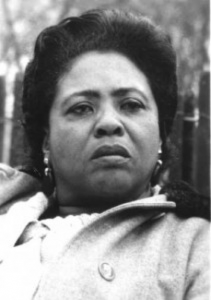Portrait of a Peacemaker: Fannie Lou Hamer

“I am sick and tired of being sick and tired,” is Fannie Lou Hamer’s famous response after being asked by a reporter why she kept pushing for equal rights for African Americans after the Democratic Party refused to sit black delegates from Mississippi at the 1964 Democratic National Convention. Fannie Lou was not short of things to be sick and tired about. She came from the world’s most oppressive place to live as a black individual, the Mississippi Delta. In her journey as a civil rights activist Hamer experienced acts of un-justice that shocked the nation. Fannie Lou Hamer challenged our nation’s government and pushed for equal rights stating “Nobody’s free until everybody’s free.”
Born the youngest of 20 children, Hamer grew up on a cotton plantation. She worked at the plantation until the age of 44, when she finally decided enough was enough. She attended a life-changing protest meeting hosted by the Student Non-Violent Coordinating Committee (SNCC). These civil rights activists were encouraging people in the black community to vote. After asking herself, “What do I really have? Not even security,” voting was an easy choice. On August 31, 1962 Hamer boarded a bus to Indianola to register to vote. When the owner of the cotton plantation that Hamer worked at heard what she had done he promptly kicked her and her husband off saying “We are not ready for that in Mississippi.”
It took three tries until Hamer finally passed her voter registration test, but she was determined. After failing the first time she swore she would return to take the test every 30 days until she passed. Hamer was so passionate about passing because she believed that blacks could change their conditions both politically and economically if they were given the opportunity to vote for the candidates that best served them.
In 1963 Hamer helped to form the Mississippi Freedom Democratic Party (MFDP). The party was able to register 60,000 black voters across the state of Mississippi. Not long after in 1964, delegates from the MFDP, including Hamer, were invited to attend the 1964 Democratic Convention. It was here that Hamer revealed to the United States the atrocity she underwent while fighting to exercise her voting rights. On June 9, 1963 Fannie Lou was traveling back home with members of the MFDP after a voter registration workshop in Charleston, South Carolina. While passing through Winona, Mississippi the bus took a stop at a terminal for passengers to get food and stretch out their legs. As members filtered off the bus and to the terminal Hamer decided to stay put. Not long after Hamer saw police cars coming to the terminal and her fellow MFDP members being put into the back of the cars. As Hamer stepped off the bus to see what was happening she was also arrested. Hamer was placed in a cell where she could hear screaming and the sound of a woman being beaten coming from another room. Hamer began to pray but it was not long before a State Highway Patrolman came to her cell and had her taken into another. It was here that the State Highway Patrolman had two black prisoners beat Fannie Lou until the men were exhausted. It was not until three days after that she was released and allowed medical attention. Hamer suffered permanent kidney damage, a blood clot in the artery of her left eye, and a limp when she walked. At the end of her speech to the convention, Hamer added, “All of this on account of we want to register, to become first-class citizens. And if the Freedom Democratic Party is not seated now, I question America. Is this America, the land of the free and the home of the brave, where we have to sleep with our telephones off the hooks because our lives be threatened daily, because we want to live as decent human beings, in America?”
The MFDP had entered the convention with hopes of unseating the official Mississippi delegation, or at least being seated with them, however their attempt failed. They succeeded, however, four years later and Hamer became the first African American to have a seat as an official delegate at a national party convention since the Reconstruction period after the Civil War, and the first woman in Mississippi history.
Hamer devoted her life to the fight for civil rights. Not only that but she also worked to help the poor in her Mississippi community, set up orgnizations to increase business opportunities for minorities, and established the National Women’s Political Caucus in 1971. She inspired those around her to take action and fight for the right to practice their freedom. She left her legacy through her strong voice and inspiring messages. Fannie Lou stated that “One day I know the struggle will change. There’s got to be a change-not only for Mississippi, not only for the people in the United States, but people all over the world.
Let us take Fannie Lou Hamer’s message and be activists for equality and justice for all people.





Leave a Reply
Want to join the discussion?Feel free to contribute!